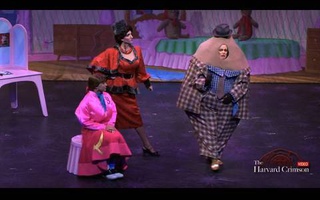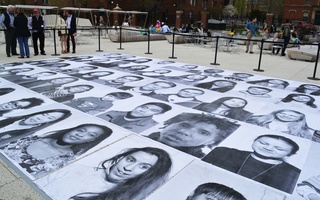Jesse T. Nee-Vogelman ’13 prides himself on being a dilettante. He acts, does technical theater for the Hasty Pudding Theatricals, and writes scripts, including the script for this year’s Freshman Musical, “Lost and Clowned.”
He also took Dramatic Arts 101: “Introduction to Theatre” last semester in order to learn more about theater from a theoretical standpoint.
“I quickly realized that most theater here is all outside the classroom,” says Nee-Vogelman.
CONCENTRATION QUESTION
University President Drew G. Faust continually has expressed her intent to funnel support into the arts at Harvard, including theater. But a number of students involved in theater have expressed concern about the prospect of a Dramatic Arts concentration, explaining that it may restrict the creative freedom they currently enjoy.
The Task Force on the Arts, which Faust commissioned in late 2007, released a report in December 2008 recommending the development of an interdisciplinary concentration in the Dramatic Arts.
“In the end, we felt that for Drama to go forward, it would be progressive...to have a concentration, as in my department,” says Alfred F. Guzzetti ’64, a visual arts professor who was a member of the task force.
Financial issues and the level of student interest are the two largest issues facing the development of any new concentration, says Marcus Stern, associate director of the American Repertory Theater (A.R.T.) and a member of the Task Force for the Arts.
The financial crisis seems to have delayed serious contemplation of a Dramatic Arts concentration by the administration. But according to Julie S. Peters, chair of the Committee on the Dramatic Arts, Dramatic Arts faculty members have expressed interest in the prospect of an eventual concentration.
The secondary field in Dramatic Arts, which was developed only two years ago, has received praise from students and faculty. However, some students have expressed concern that a full-fledged concentration could draw resources away from student-run theater productions.
“One of the things that worries me the most about having a concentration is that if people are required to get projects done, most of the resources and stuff for theater will go to the concentration,” says Elizabeth G. Shields ’10, former president of the Harvard-Radcliffe Dramatic Club (HRDC).
Students say that the current slate of Dramatic Arts courses could not accommodate a concentration because classes taught at the A.R.T. can accept only a limited number of students. As a result, many students are turned away from courses they want to take.
Bendorf tried to take Dramatic Arts 130r: “Directing” twice, but she was rejected both times.
Elizabeth J. Krane ’11, current president of the HRDC, said she shares the concern that the Dramatic Arts committee’s resources would only be available to concentrators. Furthermore, she says, fewer people might participate in student-run theater productions if there were a Dramatic Arts concentration.
Students involved in the dramatic arts say they are concerned that space constraints will only worsen if a concentration is created and the Dramatic Arts faculty does not grow.
Read more in News
Police Stop Robber Red-Handed on TRecommended Articles
-
 A Call to Arts
A Call to Arts -
Arts Year In ReviewCrimson Arts takes stock of 2013.
-
 Trumpets Herald New Office of the Arts Ceramics Studio in Allston
Trumpets Herald New Office of the Arts Ceramics Studio in Allston -
Margaret Atwood Awarded 2014 Harvard Arts MedalAcclaimed author Margaret E. Atwood was honored with the 2014 Harvard Arts Medal in a ceremony Thursday to mark the beginning of the 22nd Annual Arts First Festival.
-
 Arts First Draws Half of Harvard Undergrads
Arts First Draws Half of Harvard Undergrads -
 New Concentration Was Years in the Making
New Concentration Was Years in the Making













